|
|
|
Sort Order |
|
|
|
Items / Page
|
|
|
|
|
|
|
| Srl | Item |
| 1 |
ID:
143662
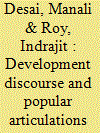

|
|
|
|
|
| Summary/Abstract |
This article discusses how members of marginalized groups in the Indian state of Gujarat make sense of hegemonic discourses about national development in light of their own experiences and material circumstances. For many, the idea of development resonates even when they do not experience material progress in their lives. This partial hegemony of development discourse can be explained by the concept of “political articulation.”. This captures the political process by which parties succeed, at specific historical moments and under certain circumstances, in joining different, even potentially conflictual interests by referring to a common idea and project. The article focuses on Ahmedabad city where the Bharatiya Janata Party (BJP) has created a cross-caste bloc through the trope of development. The BJP has been particularly effective in linking the idea of development to mundane concerns about security, identity and spatial order. However, anxieties about the degradation of labour by increased casualization, informalization, and socio-spatial marginalization have disrupted this common sense linkage and weakened the hegemony of the BJP's model of development.
|
|
|
|
|
|
|
|
|
|
|
|
|
|
|
|
| 2 |
ID:
165937
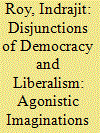

|
|
|
|
|
| Summary/Abstract |
In this paper, I make a case for appreciating the ‘agonistics of democracy’ by reflecting on political changes in the state of Bihar in eastern India since 1990. These changes compel us to appreciate the substantive deepening of democracy in Bihar despite the absence of values commonly associated with liberalism. I first highlight the emergence of ‘Backward Caste’ assertion in the state, which sought to construct the broadest possible alliance against the so-called ‘Forward Castes’ and culminated in the ascendancy of the Janata Dal government of Lalu Prasad Yadav in 1990. I next point to the inchoate antagonism harboured by poor people against the privileged who seek to assert their caste supremacy. Describing the vocabularies of dignity in which such supremacy is contested, I demonstrate that conflict is entwined with co-operation in poor people’s quotidian engagements with the privileged classes. In conclusion, I argue that an ‘agonistics of democracy’ allows us to step beyond the limitations of existing approaches to theorising democracy. I focus in particular on two such approaches: the liberalism-inspired approach dominant in many contemporary readings of democracy in India, and the critical alternatives offered by the political society-centred approach. The agonistic approach to democracy proposed in this paper enables scholars to leverage the strengths of both these approaches while avoiding their pitfalls.
|
|
|
|
|
|
|
|
|
|
|
|
|
|
|
|
| 3 |
ID:
117215
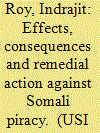

|
|
|
| 4 |
ID:
075243
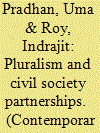

|
|
|
|
|
| Publication |
2006.
|
| Summary/Abstract |
Hitherto, South Asian governments have found it convenient to arbitrate between different sections and communities. Increasingly, however, as a multiplicity of demands surface articulating the democratic aspirations of marginalised castes, creeds, tribal peoples and other ethnic groups, governments must work in collaboration with actors in civil society. As monolithically constructed communities are splintered along ‘local’ constituents and development agencies relate rights-based programming with disaggregated data on caste, class and gender, the possibilities for multiculturalism become manifold. Democratic pluralism is key to development. This paper is based on fieldwork in two contiguous regions of South Asia; the Himalayan kingdom of Nepal, and the northern Indian state of Uttar Pradesh. On the one hand, this region has been the hotbed of linguo-religious identity construction and contestation since at least the 1870s, and especially after the 1920s. On the other hand, it has recently been witness to the emergence of strong political movements among hitherto ‘untouchable’ Dalits and landless classes, and the active interest of development agencies. Three broad themes are explored through this paper; the impact of development and markets on Dalit communities, cultures of subjugation and protest among them, and the impact of community-based groups on how they are able to negotiate and contest their disadvantages. The emergence of community-based organisations, especially those formed during the course of the struggle for labour rights, are seen as contributing to democratic pluralism. At the same time, the paper advises caution by emphasising that the formation of community-based organisations is no substitute for political advocacy or technical solutions; rather, they must be grounded in local traditions of protest to be effective.
|
|
|
|
|
|
|
|
|
|
|
|
|
|
|
|
| 5 |
ID:
181066
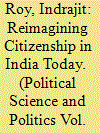

|
|
|
|
|
| Summary/Abstract |
In December 2019, the Indian Parliament amended India’s citizenship laws. Under the provisions of the Citizenship Amendment Act (CAA), Hindus, Buddhists, Jains, Christians, Sikhs, and Zoroastrians from its Muslim-majority neighbors Afghanistan, Pakistan, and Bangladesh will have their applications for citizenship fast-tracked. By explicitly omitting Muslims, Jews, Bahais, and atheists from its purview, the CAA introduced a religious filter that attacks the secular principles enshrined in the constitution. People from the six listed religious communities who entered India before December 31, 2014, were now eligible to apply for citizenship, with residence requirements reduced from 12 years to six.
|
|
|
|
|
|
|
|
|
|
|
|
|
|
|
|
|
|
|
|
|